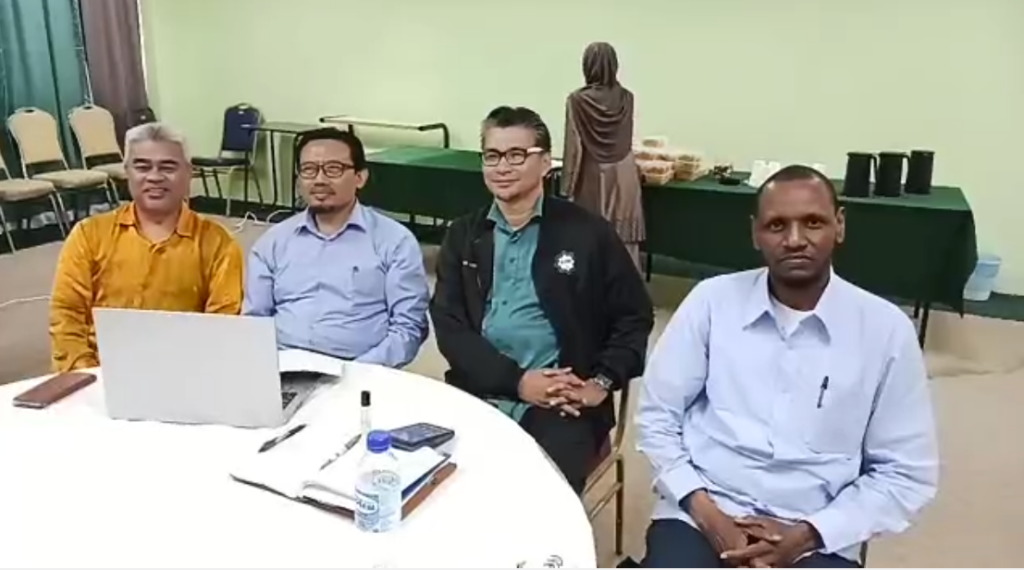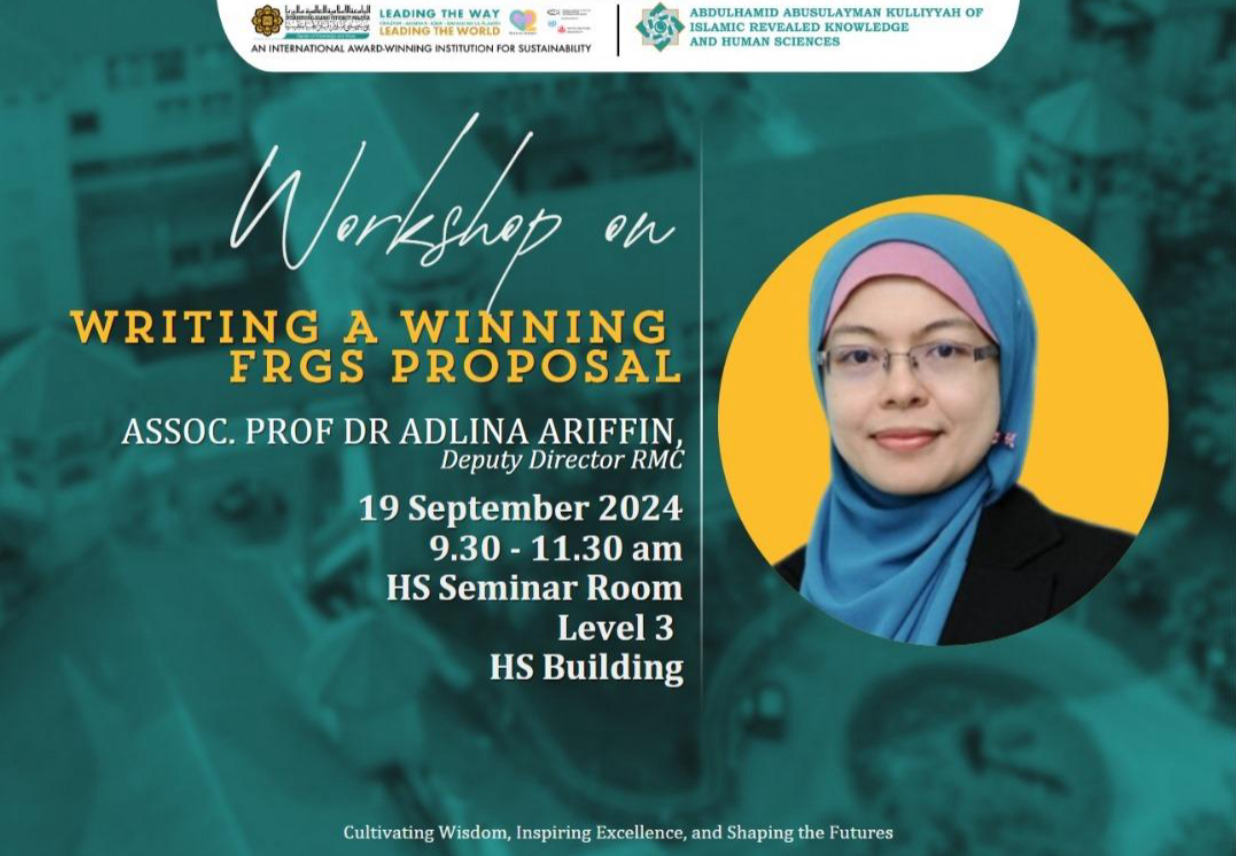By, Mohd Abbas Abdul Razak and Abdul Salam @ Zulkifli B.Muhamad Shukri
In the globalized world, we live in today, academic institutions around the globe demand that their intellectual communities conduct research that benefits not only their home countries but humanity as a whole. Gone are the days when academics were simply required to teach and pass on their knowledge to the next generation. Now, governments, industrialists, and universities are competing with one another to produce groundbreaking research.
Getting funding is a major challenge for researchers. To secure grants from government or corporate sources, they need to write a strong research proposal. This proposal helps highlight the importance of their work and convinces funders to support their projects.
Workshop Organized by AHAS KIRKHS

In realizing the difficulties faced by academics in securing a research fund, on 19 September 2024, the Abdulhamid Abusulayman Kulliyyah of Islamic Revealed Knowledge and Human Sciences organized a workshop for academics on how to write a winning FRGS proposal. Assoc. Prof. Dr. Ainul Azmin Md Zamin, the patron of the program, invited Assoc. Prof. Dr. Adlina Ariffin, a member of the faculty and the Deputy Director of the Research Management Center at IIUM, to be the guest speaker and facilitator.
The two hours or more spent listening to Assoc. Prof. Dr. Adlina was worth it in the HS Seminar Room. The presentation was lively, informative, engaging, and entertaining all at once. All participants who attended the workshop were happy, and their satisfaction was evident in the smiles on their faces.
During her presentation, Assoc. Prof. Dr. Adlina used PowerPoint slides to explain how to fill in the application form. Additionally, she highlighted the common errors that most applicants make during the proposal-writing process. As an academic and researcher who successfully obtained two FRGS grants, Dr. Adlina shared her experiences and her award-winning proposal. Among the valuable tips she provided were the need to use the correct jargon when writing the proposal and guidance on budget allocation.
The Q&A session was really interesting. The participants asked Assoc. Prof. Dr. Adlina many good questions about her earlier presentation. The workshop ended with a helpful reminder from her, encouraging everyone to try writing a research proposal.

Our Reflections on the Muslim Ummah’s Response to Research
Muslims who built great empires in the past, contributed enormously to the cause of knowledge expansion. In particular, what the Abbasid caliphs (750-1258) did for knowledge, education, and research has no parallel in Islamic annals. They not only built many mosques and libraries but also established research centers. The creation of the Bayt al-Hikmah (The House of Wisdom) became the symbol of the rise to power of the Abbasid Empire. Located in Baghdad, the Bayt al-Hikmah became one of the largest libraries of its kind and also functioned as a research centre. This library which was enriched by Hārūn al-Rashīd (786–809) came to zenith during the time of Al-Maʾmūn (786–833). Muslims, who paid importance to knowledge and learning, openly welcomed philosophers, researchers, and translators from other civilisations to work at the Bayt al-Hikmah. Using the expertise of both Muslims and non-Muslims, a large volume of valuable manuscripts from Persian, Greek, and Indian languages were translated into Arabic. Muslim scholars and philosophers not only mastered the knowledge of previous civilizations but also expanded the knowledge found in foreign manuscripts.
As an encouragement to the researchers, the Abbasid rulers were willing to give a large amount of gold as incentives not only for every new research in the areas of science, philosophy, and mathematics but also for revealed knowledge. With such intellectual activities, the Bayt al-Hikmah became one of the important centres for learning. During the Golden Era of the Muslims, learning and research centres in Muslim lands became an attraction for European scholars to come and learn through the medium of Arabic. This language of the Arabs became the lingua franca for science and philosophy.
Bayt al-Hikmah was Destroyed
In 1258, Baghdad was attacked by Hulagu Khan (1217-1265). As barbaric warriors who failed to appreciate the importance of knowledge, the Mongol army burned part of the Bayt al-Hikmah, destroying its valuable manuscripts. It is reported that hundreds of thousands of books were thrown into the Tigris, causing the river to run black for many days. Many pioneering works in science and technology were lost.
The fall of Baghdad created a chain reaction. One after another, Muslim empires began to collapse. This led to a weakening of Muslim power, both militarily and intellectually.
The Era of Western Colonization
During the era of European colonization of Muslim lands, Muslims not only lost the authority to govern their territories but also their freedom of speech. Forced to adhere to the dictates of their colonial rulers, they were unable to produce significant research that could benefit themselves or the world at large. Colonization impoverished Muslims both materially and intellectually, fostering a slave mentality among them. Living under subjugation led to widespread poverty and illiteracy, which stifled creativity and hindered their ability to progress. In short, colonization inflicted serious damage on the once-innovative minds of Muslims. Since then, they have struggled to keep pace with others in the fields of science and technology.
The Way Forward
Since most Muslim countries have gained their independence, their governments should allocate more funds from the national budget to support education, innovation, research, and development. Researchers, inventors, writers, and other intellectuals should be recognized for their contributions to both the Muslim world and humanity. Book fairs, exhibitions, and award ceremonies should be held at all levels to encourage the younger generation to engage with research. By doing so, the intelligentsia could be motivated to conduct innovative research that gains recognition on a global scale.
(Dr. Mohd Abbas Abdul Razak is an academic in the Department of Fundamental & Inter-Disciplinary Studies, AbdulHamid AbuSulayman Kulliyyah of Islamic Revealed Knowledge and Human Sciences and Assoc. Prof. Dr. Abdul Salam @ Zulkifli Muhamad Shukri is an academic in the Department of Usul al-Din and Comparative Religion of the same Kulliyyah at the International Islamic University Malaysia.)
- Islamic University VC Engages with IIUM Community on Integrating Shariah Law into Bangladesh’s Legal System - January 28, 2026
- SISCO Launches Certified Course on Visionary Leadership and Community Engagement at IIUM - January 28, 2026
- Memorandum of Understanding (MoU) Signing Ceremony between IIUM and Aafiyat Holdings Sdn. Bhd - January 28, 2026
